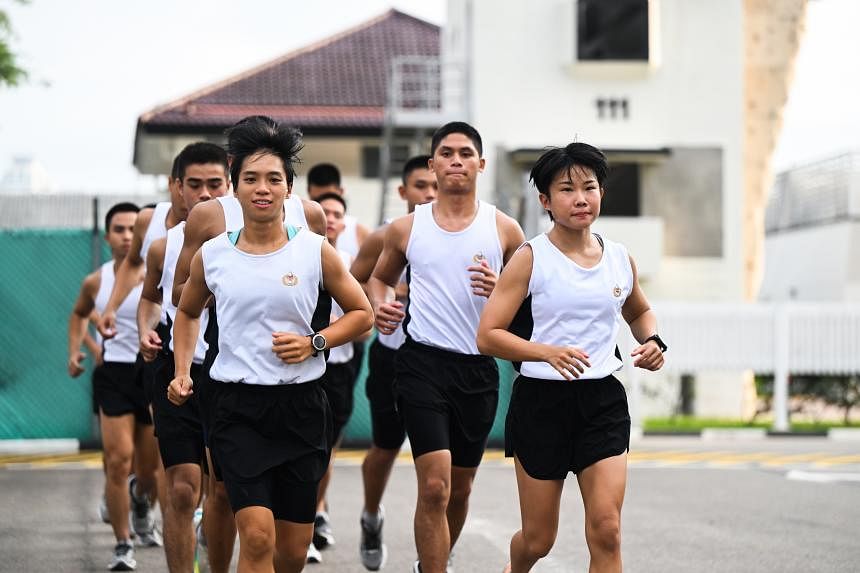SINGAPORE - Tridents are commonly associated with the Greek sea god Poseidon and his Roman equivalent Neptune.
In mythology, the weapon is a symbol of power, strength and influence. In the Republic of Singapore Navy, it is a symbol of excellence bestowed upon the top graduate of the Combat Diver Course (CDC), one of the toughest courses in the Singapore Armed Forces.
Standing at just 1.54m, a head shorter than most of her male coursemates, Captain Jhosy Ng raised the trident triumphantly at the front of the formation during her underwater graduation ceremony at Sembawang Camp on March 21.
That ceremony will go down in local military history for two milestones – the first time women have completed the arduous course since it started in 1987, and the first time a woman has topped this course.
The 32-year-old said: “I was very surprised and in disbelief because I wasn’t expecting to receive any awards. I was just very focused on graduating.”
The top graduate is selected based on overall performance in physical activities and theory tests, on top of peer and instructor appraisals.
Along with Captain Angelia Tan and 68 other male trainees, Cpt Ng joined the elite ranks of the Naval Diving Unit (NDU) after they graduated from the 60th edition of the course.
The pair are not Singapore’s first female divers – Major (Ret) Esther Tan, who joined the NDU in 2000, holds that honour.
In the past, female naval divers were not required to pass the 20-week CDC. Instead, they took a different set of courses, including a two-week basic diving course.
To even make the cut for the CDC, Cpt Ng and Cpt Tan had to prove themselves by passing the rigorous Diver Fitness Test. The test has eight stations, including chin-ups, a 500m swim and a 10m underwater swim.
Although Cpt Tan is a water sports enthusiast who has been canoeing since secondary school and dives recreationally, she failed her first Diver Fitness Test.
Looking back, the 28-year-old said that the failure was one of the biggest hurdles for her.
“It was a great setback for me because I’ve always wanted to join the Naval Diving Unit and be a part of this family,” Cpt Tan said. “I actually had second thoughts about whether I was suited to be a diver to begin with, and whether I could eventually make it through.”
But, with the support of her instructors and friends, she built up her upper body strength and ran faster, and succeeded on her second attempt.
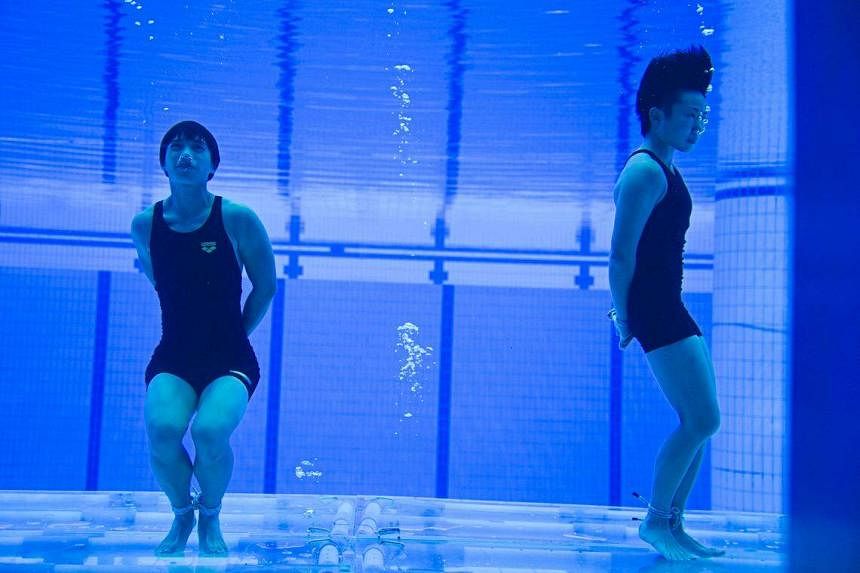
Cpt Tan said Cpt Ng was one of her biggest cheerleaders when she had to retake the test, adding that they would run and do sit-ups and chin-ups together when she was training for it.
Despite passing the test, physical fitness continued to be a challenge for Cpt Tan during the course.
Cpt Tan said: “There were moments when I wondered if this was where my limit stood, especially when it came to running.”
Her coursemates were “leaving (her) in the dust” on runs, she added.
By training with Cpt Ng, she has managed to shave two minutes off her time for her 2.4km run. She runs 2.4km in 9min 57sec now.
The secret to her success? “Run a lot. Run as hard as you can. Run with all your life,” Cpt Tan said.
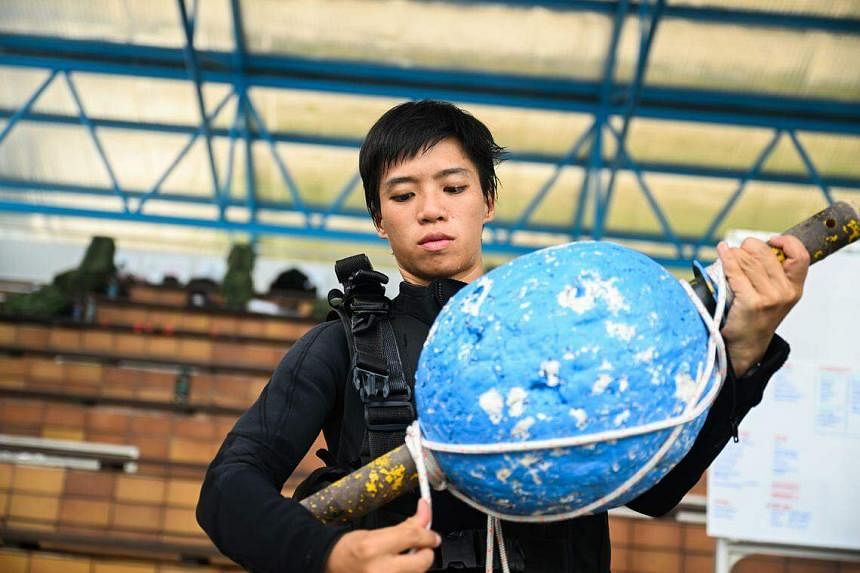
For Cpt Ng, she struggled most with the self-doubt and fear that crept in whenever she failed a particular element. “We don’t want to be seen as weak, and we don’t want to be given special treatment just because we’re females,” she said.
As the frogwomen were more senior than their coursemates, who were around the ages of 19 to 21, they were also among three course leaders selected by their instructors. This meant that on top of their own training, they had to be role models for their fellow trainees, watch out for their safety, keep morale up and more.
So Cpt Ng’s confidence took a hit when she failed a rope climb during her first attempt at a sea circuit – a series of activities including a sea swim, walking along a balancing beam, climbing up a tower and jumping off.
She said: “From then on, I practised a lot on my own on land, as well as did a lot of mental visualisation.
“Subsequently, every time I approached the rope, instead of thinking to myself ‘what if I fail’, I would think about the techniques that I needed to use and have a more positive mindset.”
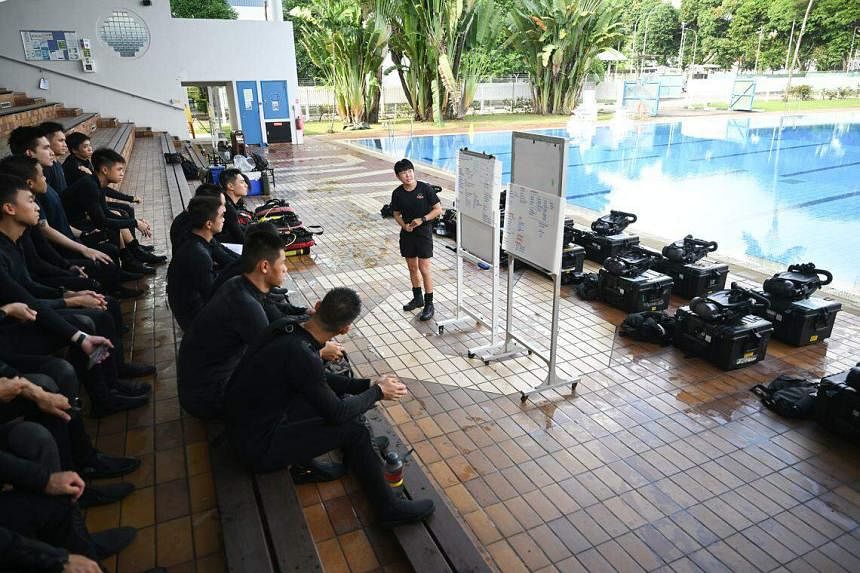
During the CDC, the two were not spared from an infamous rite of passage called Team Building Week, where trainees tend to drop out of the course. Affectionately known as Hell Week, it involves trainees being thrown into physical and mental challenges.
Challenges include sea swims and cold treatment, in which trainees are immersed in icy water.
Even though they went through hell, Cpt Ng said she persevered when she saw that her batch mates were also suffering together with her.
She pushed through simply because “I chose this path and I must finish it”.
When an NDU commander finally announced the end of Hell Week, Cpt Ng said she felt “victorious, invincible, just overwhelmed with emotion”.
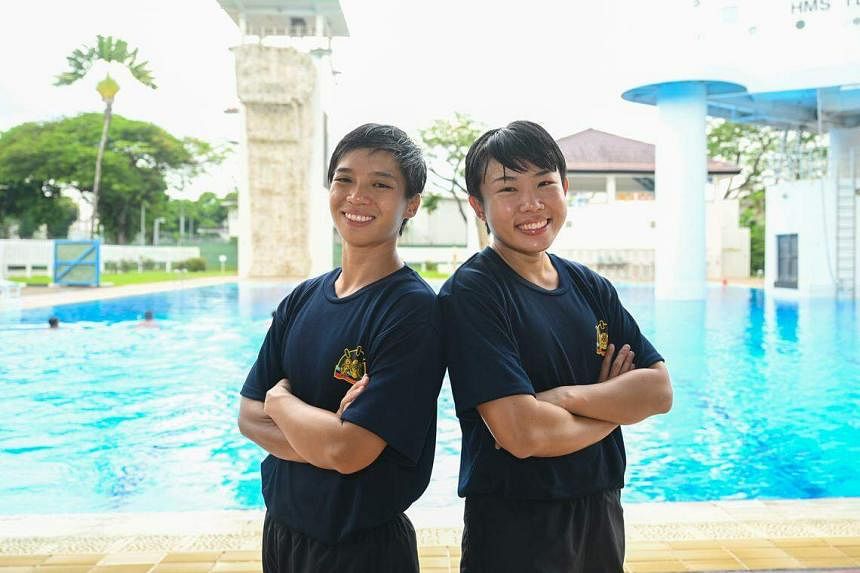
Before enlisting in the navy, Cpt Ng had been a speech therapist for three years, but switched careers to combine her love for dragon boating with her work.
She said her parents were supportive because they felt that she would thrive in a structured environment.
Cpt Ng said the course has helped her to build mental resilience, while Cpt Tan improved her people management skills.
Frogman School’s deputy commanding officer, Major Max Chow, said the two women were subject to the same training standards and outcomes as their male counterparts during the course.
For instance, all trainees – including Cpt Ng and Cpt Tan – had to carry scuba diving gear that weighed about 30kg during the course. It was more than half of the women’s individual weight, as both women weighed less than 50kg by the end of the course.
He said: “They are somehow scoring much better, or better, than some of the males.”
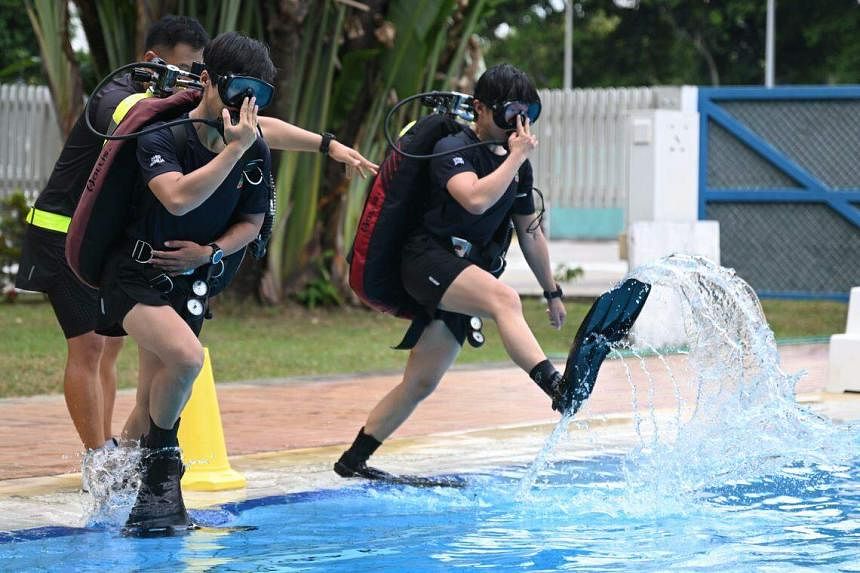
On the duo, Sembawang GRC MP Poh Li San, the first full-time female aide-de-camp to a Singapore president, said: “I commend Cpt Tan and Cpt Ng for their courage to choose this path of extreme physical and mental challenges, for men and even more so for women.”
Ms Poh, a former air force helicopter pilot who conducted search and rescue operations in a Super Puma helicopter, added: “Over the decades, our SAF women warriors have realised their ambition to chase their dreams, demonstrated their will and steel to break glass ceilings and proven their abilities, working and fighting alongside our male teammates.
“These trailblazing women have anchored in building blocks for future generations of women to equally contribute and take on the duty to protect our country.”
Cpt Ng and Cpt Tan are currently on another course and will subsequently be deployed in NDU’s Clearance Diving Group, taking on underwater security operations and the disposal of explosives.
Cpt Ng said that the pair are thankful for the “once-in-a-lifetime opportunity” to be a part of the CDC.
Cpt Tan said: “We hope we pave the way to inspire more females to take on the challenge and come join us. Being female doesn’t limit you in what you want to do.”
